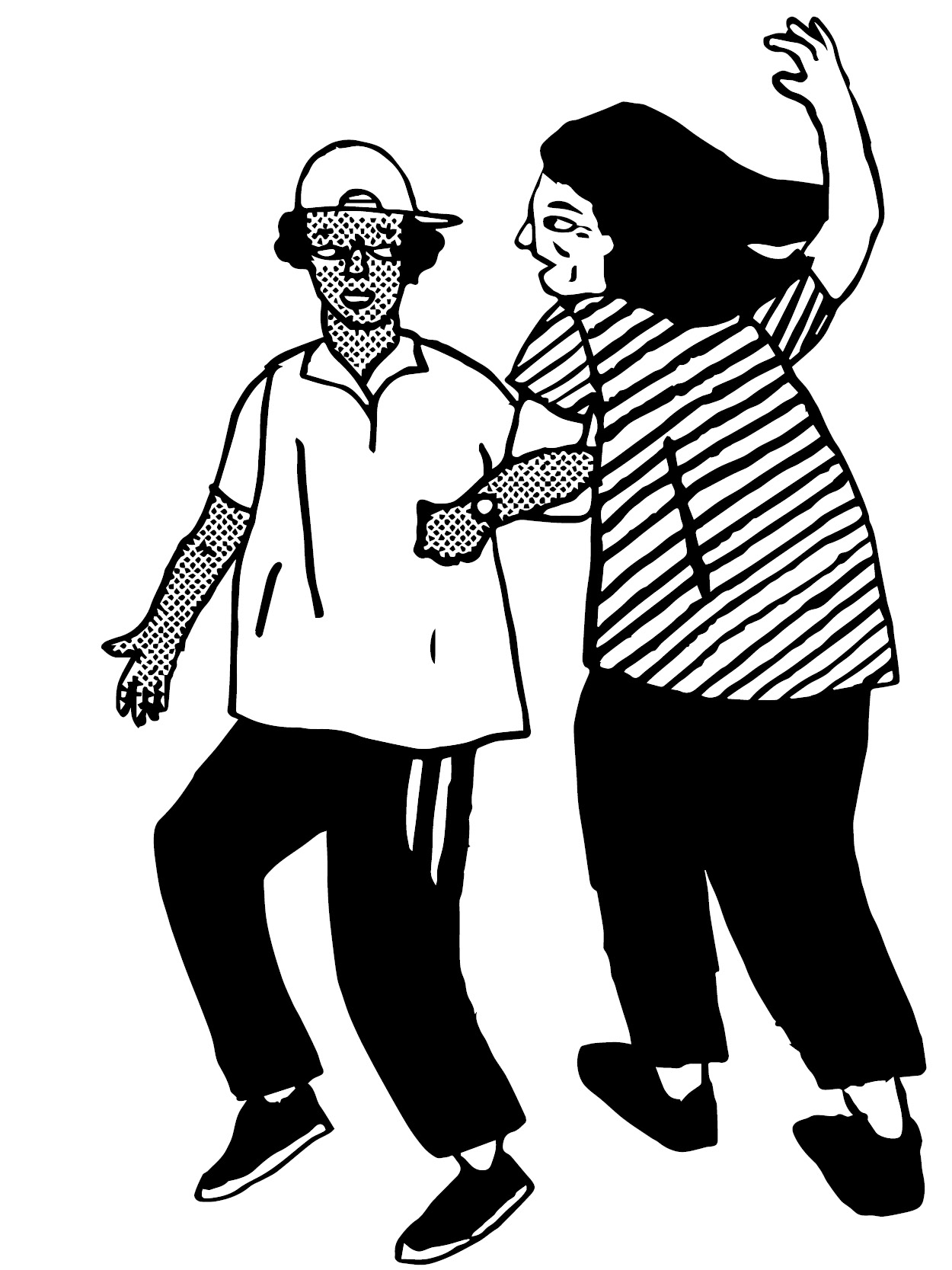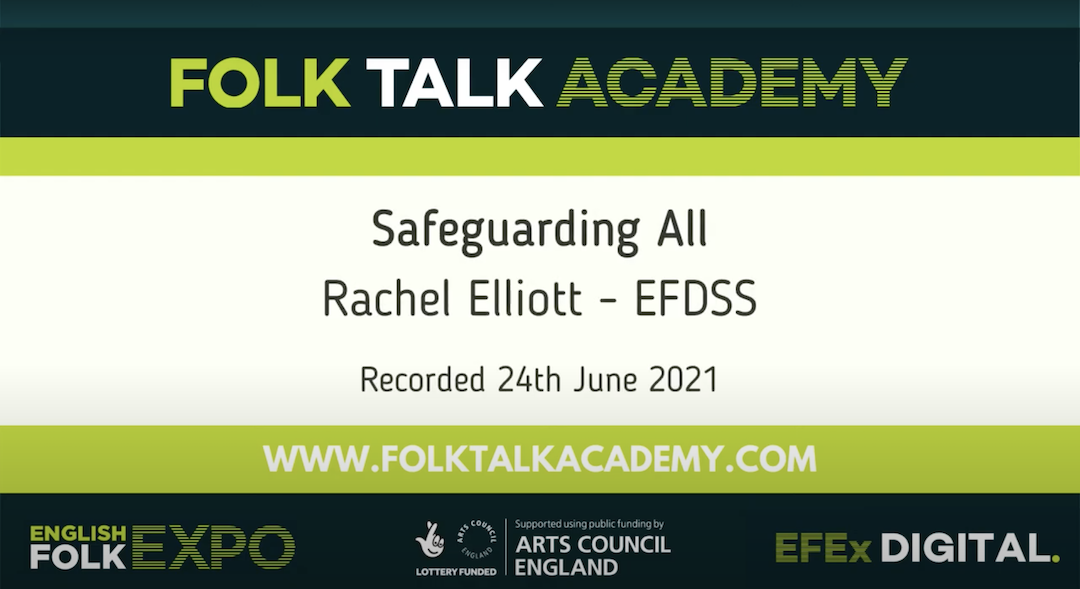Safeguarding info and tools
At the English Folk Dance and Song Society we believe everyone participating in folk music, dance or other arts should be able to do so safely and without fear of oppression or abuse.
We work to promote best practice in safeguarding, to support those in the sector by signposting helpful sources of advice, and to facilitate honest discussion and positive action.
Anyone in a paid or voluntary leadership or organiser role within the folk arts has a duty of care towards people involved in their activity.
Please read our current Safeguarding Policy on our Policies webpage, which now incorporates our Safeguarding Guidelines for Online Learning. It is important that each group or organisation creates its own policies based on its unique situation. All organisers need to ensure that their group or organization has its own safeguarding policy, which should be reviewed and updated annually.
A Code of Conduct, for your venue festival, club or activity, clearly displayed, shared, and implemented, is another important tool in challenging and eradicating abusive and oppressive behaviour. Read our Code of Conduct.
Another example is Music Industry Code of Practice which is a set of principles to tackle and prevent bullying, harassment, discrimination and other forms of inappropriate behaviour for all those working in the music sector. EFDSS, and many other music organisations, support and promote this.
Safeguarding Report Form: Word or PDF
Please download, complete and return this form to record any safeguarding concerns you may have that relate to EFDSS or our activities. Once completed it should be emailed as soon as possible to the relevant EFDSS Safeguarding Officer (names and contact details are contained in the EFDSS Safeguarding Policy).
Remember, whenever you lead or organise an event – whether you volunteer or are paid – you have a duty of care towards everyone who is involved.
Below are some resources that may help young people and adults learn more about the complex area of Safeguarding, and how to take effective action to prevent and report concerns.
Advice, Information and Training
Anne Craft Trust is a national charity which exists to minimise the risk of abuse of disabled children and adults at risk. anncrafttrust.org/
Brass Band England’s BandSafe resources and training have been developed in partnership with the NSPCC and are aimed at volunteer-led, multi-generational contexts.
bbe.org.uk/BandSafe
Members of the English Folk Dance and Song Society can access BandSafe for the same discounted rate as BBE members. This includes full access to BandSafe Toolkit of resources; BandSafe safeguarding training; DBS checks; Body Of Persons Approval (BOPA) for groups (not individual members); and ongoing advice on safeguarding and child performance licensing issues. Read more
Childline supports anyone under 19.
childline.org.uk/info-advice/bullying-abuse-safety/abuse-safety/
The Disclosure and Barring Service (DBS) provides advice on who needs a check, at what level, and how to get one. See this section on the Government website.
gov.uk/criminal-record-checks-apply-role
EduCare child protection in music online training course
educare.co.uk/courses/child-protection-in-education-music
FPA, the sexual health company, produced this useful summary of the law regarding sexual abuse and sexual misconduct across the UK. It is still current even though produced in 2015.
fpa.org.uk/factsheets/law-on-sex
Independent Society of Musicians (ISM) advice, resources and DBS checks for members who teach music.
ism.org/advice-centre/child-protection-safeguarding
LawStuff provides information for young people with a section on physical, sexual and mental health.
lawstuff.org.uk/sex-health-drugs/rape-and-other-forms-of-abuse/
Musicians’ Union advice on best practice in child protection for music teachers.
musiciansunion.org.uk/working-performing/music-teaching/safeguarding-and-child-protection-in-education
NAPAC (the National Association for People Abused in Childhood) offers support to adult survivors of all types of childhood abuse. napac.org.uk
The NCVO provides clear information about the importance of safeguarding, and practical advice on how to implement it, within the voluntary sector including volunteer-led groups.
knowhow.ncvo.org.uk/safeguarding/what-is-safeguarding
National Network for Children in Employment (NNCEE) works to improve working conditions and share information about safeguarding for children in employment and entertainment nncee.org.uk
The NSPCC is the authoritative source of information and advice on safeguarding children and young people.
learning.nspcc.org.uk/safeguarding-child-protection
Rape Crisis has information to help victims/survivors understand about consent and suggests options for next steps.
rapecrisis.org.uk
SAFEcic provides a wide range of thorough and cost-effective safeguarding training, resources and advice.
safecic.co.uk
Safer Dance (Dance School Safeguarding Working Group) – a collective voice promoting high standards of safeguarding in dance teaching in out-of-school settings in order to protect children and young adults. Provides helpful resources and information.
dsswg.org.uk/
The Social Care Institute for Excellence contains information on safeguarding adults.
scie.org.uk/safeguarding/adults
Stop it Now works to prevent child sexual abuse. It provides information, confidential advice, and reporting for anyone concerned about their own behaviour or the behaviour of others; and for people who have experienced abuse.
stopitnow.org.uk
Professional Support
Rape Crisis have a free one-to-one live chat helpline providing confidential emotional support for people who have experienced sexual violence. They can also help victims to think through options and next steps rapecrisis.org.uk
Victim Support provides support and advice to help victims (and their concerned friends) recover from the effects of crime and traumatic events. There is a free helpline or online support. They can give expert advice and will help you whether or not you decide to report the crime. This may give you more confidence if you do decide to report to the Police. victimsupport.org.uk
Reporting
Report to the police
Reporting crimes or concerns to the Police is important to enable appropriate follow-up action.
There are statutory reporting duties and pathways for those in positions of responsibility to children and adults at risk where harm or possible harm has occurred (see EFDSS’ Safeguarding Policy, for example).
Although reporting to the Police can feel daunting, there are multiple ways this can be done, and to the level that you want or feel able to go to.
You may be the victim or witness to a crime and not sure whether or how you want to report the crime. Or the colleague or friend of a victim, or even perpetrator. Remember, there are organisations that can help advise and support you in this process, for example Victim Support .
Bear in mind, the Police will not necessarily act against the perpetrator unless the victim wishes to press charges. This depends on the age of the victim, the nature of the crime, and the relationship between the victim and perpetrator. Reporting can also be done in stages, depending on what the person reporting the crime, and the victim themselves feel, and how far they want to take things.
- In an emergency dial 999.
- Non-urgent matters can be reported by calling 101.
- Most police forces also offer multiple methods of reporting including via text message, email, and online chat.
Crime Stoppers enable crimes to be reported anonymously by calling on 0800 555 111. They will pass the information to the police. crimestoppers-uk.org
Musicians’ Union’s Safe Space exists to provide a safe space for all musicians to share instances of sexism, sexual harassment, and sexual abuse in the music industry. They provide an email address for reporting concerns. musiciansunion.org.uk/safespace
Folk-Specific Information and Support
EFDSS’ Folk Education Network is free to join and provides access to a peer support network for people working and volunteering in folk arts learning and participation.
efdss.org/folk-education-network
The Bit Collective is a community of people interested in discussing and addressing equalities issues in Scottish folk and traditional music. Their #TradStandsWithHer project calls for actions which protect women in folk and traditional music from sexual harassment and assault, and sends a clear zero tolerance message to male perpetrators. thebitcollective.co.uk/tradstandswithher
Esperance is a grassroots collective of people who wish to discuss and address gender equality issues in the English folk scene. They aim to increase awareness and understanding of gender-related barriers, support people who experience gender-based discrimination, and facilitate conversations that lead to positive change.
esperancefolk.com
FairPlé aims to achieve gender balance in the production, performance, promotion, and development of Irish traditional and folk music. They advocate for equal opportunity and balanced representation for all. They have advice on tackling sexual harassment in this area of music in the Republic of Ireland. Much of this is relevant to the situation in the various nations of the UK.
fairple.com/sexual-harassment
For our Safeguarding Policy (includes Online Learning) Guidelines see efdss.org/policies
For our Code of Conduct see efdss.org/code-of-conduct
Safeguarding All
Rachel Elliott, Director of Education, gave a presentation about Safeguarding All to English Folk Expo’s Folk Academy in June 2021. Watch on YouTube:
[Last updated March 2023]
Support us, and support the folk arts
We champion folk music and dance at the heart of cultural life, all across England.
Donations provide immediate support. But even more than that, they prove that so many people value what we do – helping us to secure funding from partner organisations.
Can you donate today?










